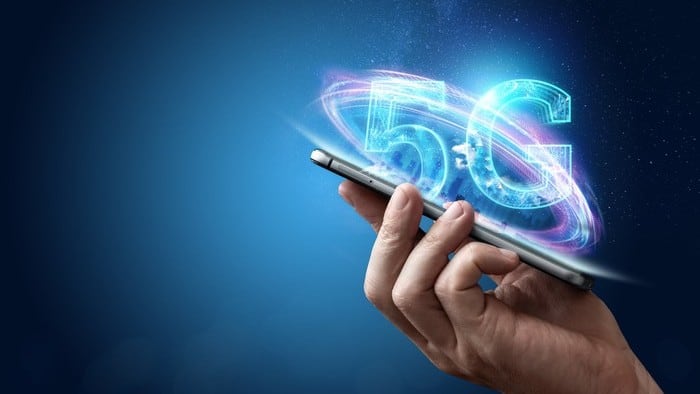This article was originally published on Fool.com. All figures quoted in US dollars unless otherwise stated.
Apple's (NASDAQ: AAPL) iPhone 12 quickly climbed the charts to become the best-selling 5G smartphone in October last year despite being on sale for just a few days of that month. Fresh data from market research firm Counterpoint Research indicates that Apple's iPhone 12 lineup has remained in hot demand ever since.
Some updated reporting from Counterpoint reveals that Apple produced six of the top 10 best-selling smartphones for the month of January 2021. The iPhone 12, the iPhone 12 Pro Max, the iPhone 12 Pro, and the iPhone 11 were the top four best-selling smartphones that month. The iPhone 12 mini and the 2020 iPhone SE also made the list. What's more, a closer look at the list tells us that Apple's domination of the 5G smartphone space continues. Here's why.
The iPhone 12 is leaving others behind in 5G
China's Xiaomi and South Korean smartphone giant Samsung were the other two manufacturers whose devices made it to the top 10 list. Xiaomi's Redmi 9A and Redmi 9 were the fifth and sixth best-selling smartphones in January, but what's worth noting is that they are way cheaper than Apple's offerings.
The Redmi 9A can be bought for just $120 in the U.S. Customers can buy the device for around 89 pounds in the U.K., and for less than 100 euros in Germany. The Redmi 9 is slightly more expensive with its price hovering around $150 in the U.S. The 5G variant of the Redmi Note 9, however, starts at $290 for the Chinese version. Samsung's Galaxy A21S and Galaxy A31 are the two smartphones that completed January's top 10 list, and they are priced at around $200 in the U.S.
The cheapest Apple device on the list is the 2020 iPhone SE, which starts at $399 in the U.S. The iPhone 12, which tops the list, starts at $799, while the second-ranked iPhone 12 Pro Max begins at $1,099. The iPhone 12 Pro is ranked third. This makes it clear that Apple is enjoying solid pricing power as customers are preferring the more expensive iPhone 12 models -- all of which are 5G-enabled.
That's not surprising as Apple has hit the sweet spot as far as pricing the iPhone 12 series is concerned. Samsung's latest Galaxy S21, for instance, starts at almost $800, which is equal to the starting price of the regular iPhone 12. But Apple gives customers on a budget the option to buy a 5G-enabled smartphone for $699 in the form of the iPhone 12 mini.
Another factor that could be playing in Apple's favor is the higher average selling price (ASP) of 5G smartphones.
IDC estimates that the ASP of a 5G smartphone stood at $600 last year, and a similar level can be expected in 2021. The increasing proportion of 5G as a percentage of overall smartphone shipments is pushing the industry's ASPs higher. IDC forecasts that the ASP of a smartphone will now be $363 this year as compared to the earlier forecast of $349.
Customers' preference for Apple's iPhone 12 when it comes to paying a premium for 5G devices also reflects in the company's improved market share. The company held 23.4% of the overall smartphone market at the end of the fourth quarter of 2020, a sharp increase over just 11.8% in the third quarter. This sharp spike clearly shows how the iPhone 12 launch has impacted Apple's positioning in the 5G era.
The Apple juggernaut will keep rolling on
Hundreds of millions of iPhone users are reportedly in an upgrade window that has triggered a "supercycle." Supply chain checks indicate that Apple is making substantially more devices than usual this year to cater to that installed base, and that's translating into an impressive sales performance.
Given the pricing power Apple is enjoying in the 5G era, it is not surprising to see why the company is expected to set new sales records this year. Daniel Ives of Wedbush is forecasting 250 million units in iPhone sales this year, and the momentum could spill over to 2022.
Apple supplier Taiwan Semiconductor Manufacturing, or TSMC, is expected to start the volume production of the A15 chip that will likely go into this year's iPhone by the end of May. For comparison, the A14 chip used in the iPhone 12 went into production in June last year. Additionally, the smartphone giant is expected to place initial orders for 100 million units of this year's iPhone lineup, a 25% increase over last year.
Meanwhile, 5G smartphone shipments are expected to more than double in 2021 to 540 million units. Shipments are expected to exceed more than a billion units by 2025, according to IDC. With the way Apple's sales are flourishing amid the advent of 5G smartphones, it could consistently clock strong shipment growth in the coming years and remain a top 5G stock for the long run.
This article was originally published on Fool.com. All figures quoted in US dollars unless otherwise stated.









